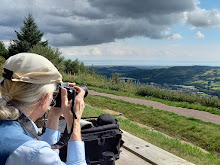Cosy dinner by the fireside.
6 Boston chairs completed. Phew.
Showing posts with label Boston chair. Show all posts
Showing posts with label Boston chair. Show all posts
Saturday, June 8, 2019
Saturday, May 18, 2019
Monday, May 13, 2019
Chair Components.
Enough for 7 chairs, hopefully. That is, 15 separate pieces make up one chair. Been a bit of a tester this one.
Side Stretchers.
Two of these per chair. Note to self: don't forget to standerdise the profile start from the centre end.
Monday, May 6, 2019
Side Seat Rails
Mill out the shapes, including the recesses in the top to take the seat.
To mill the joints, use the vice to orientate using a square to set the vertical.
To mill the joints, use the vice to orientate using a square to set the vertical.
Rear Splat
Use the preformed press to glue two marquetry pieces of mahogany together to achieve to curve. Sick a scaled drawing of the shape onto the part with double sided tape. Roughly machine around the profile and then finish with the fine file.
Rear Stretcher
Set the scribes and calipers to the correct dimensions from Norman's drawings,
and turn, trying not to create too many scraped parts.
and turn, trying not to create too many scraped parts.
Thursday, May 2, 2019
Rear Seat Rail
First mill the top curves.
Use a routing tool to create the side curve.
Finally mill the joint tabs. For this, first even up the ends pieces so that the component can be easily turned to create even tabs. Tab thinkness, 1 mm.
Use a routing tool to create the side curve.
Finally mill the joint tabs. For this, first even up the ends pieces so that the component can be easily turned to create even tabs. Tab thinkness, 1 mm.
Saturday, October 20, 2018
Boston Chair Prototype Completed (well almost)
Frame minus the stretch spindles,
three of which for each chair to turn.
Thursday, October 18, 2018
Seat Side Rails
Jig for profiling and recessing to take seat pad. Also joint tabs cut to angle and cut to length here.
Front Seat Rail
- Cut the underside recess using the even profile on the side of the jig.
- Machine the outside profile.
- Machine the recess using the profile on the opposite side of the jig.
- Using the jig saw cut the outside of the rail end tags. Use the cuts in the jig to establish the correct position for the cuts.
- Finish the tabs by hand using the jigsaw.
Monday, September 3, 2018
Sunday, September 2, 2018
Boston Chair Prototype - The Back
Monday, August 27, 2018
Boston Chair - Back Legs
I first put together a jig to achieve repeatably for the slender legs. Since 6 chairs are need for the set, 12 as near identical legs as is practical to achieve is a major goal.
The jig is first used to mark out with a draftsman's pencil one side of the legs profile on the mahogany, 3mm thick, before roughing the shape using the fret saw.
I came across this method of finishing a profile on Utube in a search for how to make the front legs, more of which later. Essentially, the pin is used as a guide to follow the profile required.
Using the jig,
the cut on the leg is guided by the profile. I found that there was a danger of the jig lifting as the tool sometimes snatches the wood, spoiling the work piece or worse, damaging the profile on the jig - hence the enclosed cutter. A damaged jig means making a fresh one!!! Also, a bit safer to use with less chance of catching your fingers. Ouch!!! Repeat the process for the other side of the leg.
Dada.......12 legs for 6 chairs.
Another jig was made to assist in machining the slots and holes on the inward facing surfaces of the legs, 6 being left hand and 6 right hand for the stretchers connecting the two legs.
The slots and hole were machined using a 1mm diameter mill.
To be perfectly honest, I was very skeptical about being able to turn wood down to a 1mm diameter, but here is the proof that it can be done.
The first trp joint.y at assembly. So far so good.
After fixing the legs length against the jig, use a file to form the 1 mm dia. peg for the chair to
Furniture Making..... in Miniature
Each piece has scale drawings of its components which make scaling from a scanned copy down to 1/12th scale a doddle.
So, for this is the second 'furniture' to make, a Queen Anne side chair to accompany the already made dining table. Will need to to make six of these.
Subscribe to:
Posts (Atom)







































